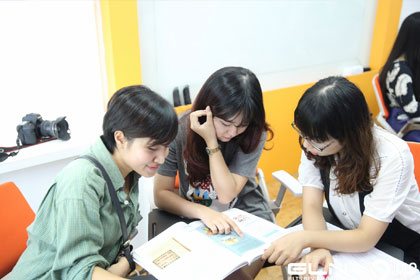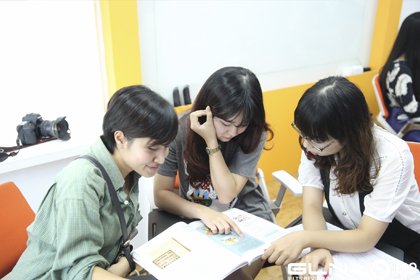Chủ đề FAMILY AND CHILDREN không còn quá xa lạ với những thí sinh IELTS. Thường xuyên xuất hiện trong các đề thi Writing Task 2, hội đồng Cambridge ngày càng biết cách “làm khó” thí sinh bằng cách đào sâu, khai thác thêm rất nhiều khía cạnh khó của mỗi chủ đề.
Ở topic Family and Children này, các bạn có thể sẽ được yêu cầu bàn về các vấn đề như: Generation gap (khoảng cách thế hệ), Domestic violence (bạo lực gia đình), Parenting and Child-rearing (nuôi dạy và giáo dục con cái), obligations and responsibilities of parents to children (nghĩa vụ và trách nhiệm của bố mẹ với con cái), influences of parents on children (tầm ảnh hưởng của bố mẹ với con cái), relationships among family members (mối quan hệ giữa những thành viên trong gia đình),...
Trong bài viết này, JOLO sẽ cung cấp cho bạn trọn bộ từ vựng và idioms xoay quanh chủ đề FAMILY AND CHILDREN, đồng thời đưa ra những đề mẫu kèm sample essay để bạn tham khảo và áp dụng cho bài viết của mình dễ dàng hơn.

A. TỪ VỰNG CHỦ ĐỀ FAMILY AND CHILDREN
1. Từ vựng về các kiểu gia đình
- Immediate family: gia đình ruột thịt (bao gồm ba, mẹ & anh chị em ruột)
- Nuclear family: gia đình hạt nhân (chỉ có bố mẹ và con cái)
- Extended family: gia đình mở rộng (bao gồm ông bà, cô chú bác, cậu, mợ…)
- Single - parent family: gia đình có bố/mẹ đơn thân
- Childless family: gia đình chỉ có bố mẹ mà không có con cái
- Step family: gia đình có bố hoặc mẹ kế
- Blended family: gia đình mà cả bố lẫn mẹ đều đã từng đổ vỡ trong hôn nhân và có con riêng ở cùng
- Unmarried family: gia đình có người đàn ông và người phụ nữ chưa cưới nhưng lại sống cùng nhau
- Communal family: một nhóm các gia đình sống cùng nhau và cùng chia sẻ trách nhiệm
- Adoptive parents: bố mẹ nuôi
- Family tree: sơ đồ gia đình
- A relative: người thân họ hàng
- Blood relative: có quan hệ ruột thịt
- Next of kin: thân nhân gần nhất
- Distant relative: họ hàng xa
- Loving family = Close-knit family: gia đình êm ấm, gần gũi, thân thiết nhau
- Dysfunctional family: gia đình không êm ấm, hay tranh chấp, cãi vã
- Broken home: gia đình tan vỡ
- Single mother: mẹ đơn thân
- Descendants: con cháu
- Ancestors: tổ tiên
- Blue blood: dòng giống hoàng tộc
- A/the blue-eyed boy: đứa con cưng
- Children = offspring = kids: con cái
- Overindulged children: những đứa trẻ được chiều chuộng
- Family bond: sự gắn kết, mối quan hệ gia đình
2. Từ vựng mô tả các mối quan hệ trong gia đình
- Carefree childhood: tuổi thơ êm đềm
- Troubled childhood: tuổi thơ khó khăn
- Family breakdown: sự tan vỡ gia đình
- Divorce (v) (n): ly dị, sự ly dị
- Bitter divorce: ly thân (do có xích mích tình cảm)
- Messy divorce: ly thân và có tranh chấp tài sản
- Get on (well) with somebody: có mối quan hệ tốt/hòa hợp với ai
- Get along with somebody: hòa hợp với ai
- Have something in common: có điểm chung
- Get together: tụ họp
- Sibling rivalry: anh em mâu thuẫn nhau
- Fall out (with somebody): tranh cãi với ai
- Quarrel/squabble with: tranh luận, cãi vã với ai
- Have a falling out: tranh cãi, cãi vã và gây tổn hại đến các mối quan hệ
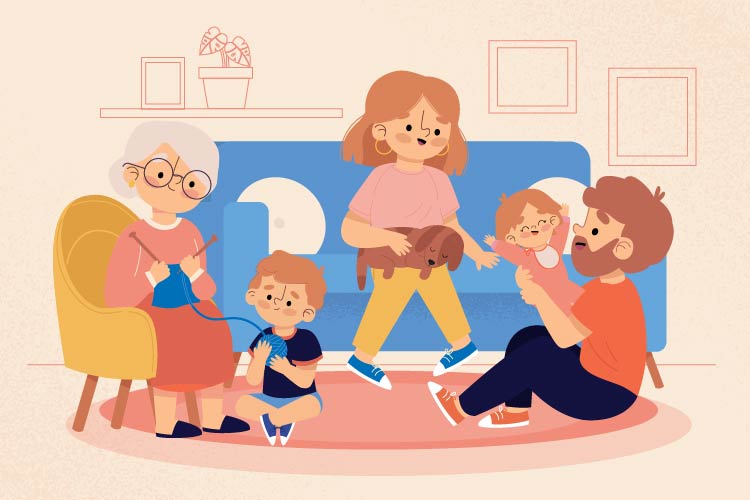
3. Từ vựng về Parenting (nuôi dạy con)
- Custody of the children: quyền nuôi con (sau khi li dị ba mẹ sẽ tranh chấp quyền nuôi con)
- Grant joint custody: vợ chồng sẽ chia sẻ quyền nuôi con
- Sole custody: chỉ vợ hoặc chồng có quyền nuôi con
- Pay child support: chi trả tiền giúp nuôi con
- Give the baby up for adoption: đem con cho người ta nhận nuôi
- Parental guidance/ care/ monitoring: sự hướng dẫn của cha mẹ
- Parental supervision: sự giám sát của cha mẹ
- Motherhood: làm mẹ
- Fatherhood: làm cha
- Delay/ Postpone parenthood: có con trễ/muộn
- To start a family: có con
- To give birth – to have a baby: sinh con
- Family man: người đàn ông của gia đình
- Family life: cuộc sống gia đình
- To raise (a child): nuôi một đứa trẻ
- To bring up (a child): nuôi một đứa trẻ
- Upbringing: sự nuôi dưỡng, dạy dỗ
- To support (a family): hỗ trợ gia đình
- Breadwinner: trụ cột gia đình
- Dependant: người phụ thuộc
- To adopt: nhận nuôi
- To foster: chăm sóc một đứa trẻ, thường trong một thời gian nhất định, mà không trở thành cha mẹ hợp pháp của con
- Over-protective parents: cha mẹ kiểm soát con quá đà
- Spoilt child: đứa trẻ hư
- Single parent: cha/mẹ đơn thân
- Stay at home parent: cha/mẹ không đi làm mà ở nhà chăm con
- To look after – to take care of: chăm sóc
- Childcare: chăm sóc trẻ em
- Strict: nghiêm khắc
- Authoritarian: độc đoán
4. Idioms chủ đề Gia đình
- The apple of one’s eye: người được yêu mến
- Pride and Joy: niềm tự hào và hạnh phúc
- (Just) one big happy family: một đại gia đình hoà hợp và yêu quý nhau. (Cần lưu ý đôi khi cụm từ này có thể sử dụng theo hàm ý mỉa mai)
- Bad blood: mối quan hệ không tốt
- To wear a pants: người nắm quyền trong nhà
- To rule the roost: người chịu trách nhiệm chính
- Men make houses, women make home: đàn ông xây nhà, đàn bà xây tổ ấm
- Bring home the bacon: kiếm tiền nuôi gia đình
- Run in family: đặc điểm chung của một gia đình (di truyền)
- Run in somebody’s blood: đặc điểm tự nhiên, ăn sâu vào máu của ai đó
- Black sheep: một người rất khác biệt so với các thành viên còn lại trong gia đình
- East or West, home is best: dù có đi đâu thì nhà cũng là nơi tuyệt vời nhất
- No matter where you go, home is always the best place for you to come back: dù bạn có đi đâu thì nhà cũng là nơi tuyệt vời nhất để quay trở về
- Blood is thicker than water: một giọt máu đào hơn ao nước lã
- Your (own) flesh and blood: máu mủ, ruột thịt
- Like father, like son: cha nào, con đấy
- The apple doesn’t fall far from the tree: con nhà tông không giống lông cũng giống cánh
- Break one’s neck: nai lưng ra làm, cố gắng hết sức
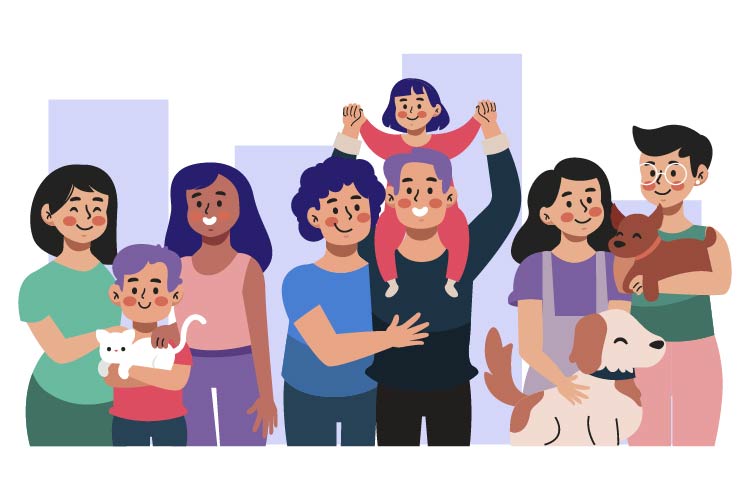
B. BÀI MẪU IELTS WRITING TASK 2 CHỦ ĐỀ FAMILY AND CHILDREN
1. In recent years, the structure of a family and the role of its members are gradually changing.
What kinds of changes can occur? Do you think these changes are positive and negative?
⇒ Sample Essay 1:
It is true that these days the family structure has considerably shifted, and the changing roles of men and women in the family have become increasingly similar. There are several new forms of family composition, and in my opinion, these developments are not always desirable.
In the past, nuclear families where parents and their offspring living together under one roof used to be prevalent. However, there is now a huge trend towards single-parent families due to more marriages ending in divorce, while the increase in cohabiting couple families and stepfamilies is probably a result of cohabitation and remarriage becoming much more acceptable. In addition, the number of single-mother families has increased as many mothers want to have children without getting married. In terms of changing parental roles in a family, there has been a rise in the number of stay-at-home dads in recent years when it has become normal for women to gain qualifications and pursue their own career path. This is in sharp contrast to about half a decade ago when men were breadwinners, and women were in charge of household chores in their families.
In my view, the changes described above could have both positive and negative consequences. On the one hand, due to the lack of emotional attachment and legal binding, non-traditional households such as stepfamilies and cohabiting parents are more prone to breaking down. Consequently, children of these families are more likely to be involved in antisocial behaviors while their parents may experience feelings of loneliness and worry. On the other hand, the changes in the roles of members in the family could be seen as progress because women are not put under pressure to sacrifice their own careers to assume childcare and domestic responsibilities.
In conclusion, I believe that the changes in the roles of family members and the family structure are both positive and negative.
(311 words)
2. Some parents prefer to have their children be raised by their grandparents. Some prefer to raise them on their own.
Which would you prefer and why?
Include specific details and examples to support.
⇒ Sample Essay 2:
Many people choose to ask their parents to assist them in taking care of their sons and daughters while others think that they need to nurture their own offspring. This essay believes that parents and grandparents should work together to raise their family. Firstly, this essay will discuss the benefits of raising the children with their grandparents and secondly, the advantages of nurturing your own child.
On the one hand, parents nowadays find it difficult in balancing the time between work and taking care of their families. They seek the help of the grandparents to assist them in taking care of the kids because they need to work hard in order to provide the monetary needs of their family. This also can boost the confidence and give energy to the grandparents since they know that they are still needed, even if they are old. For instance, an article in the Manila Bulletin in 2017 revealed that grandparents are more likely to live longer while raising their grandchildren versus grandparents who live alone.
On the other hand, most parents would want to raise their children by themselves. They want to be there to assist their child in every step of the way for they believe that nurturing is very important in order to raise a responsible individual. This practice can also strengthen the ties between family members, for they know that they will support each other no matter what. Children raised by their parents are more likely to become more caring and have a positive outlook on life. For example, a study by the Child Psychology of the Philippines in 2015 revealed that children raised by their parents are happier and healthier versus children raised by nannies.
In my opinion, I believe that parents should raise their children with the help of their grandparents. They need to work together, for bringing up a child is a difficult job and they need each other in order to withstand the hindrances and problems that they can encounter. Children need a strong support system to help them conquer fears and reach their aspirations. To know that there are a lot of people who support and love you is a good weapon to survive the demanding world. For example, in my own experience, I spent my childhood with both of my parents and grandparents and this made me a better person because I know that there will always be people who will love and accept me no matter what.
In conclusion, parents and grandparents should help one another in raising a child. They need the love, care and support in order to help mould them into a better and wiser individual someday.
(447 words)
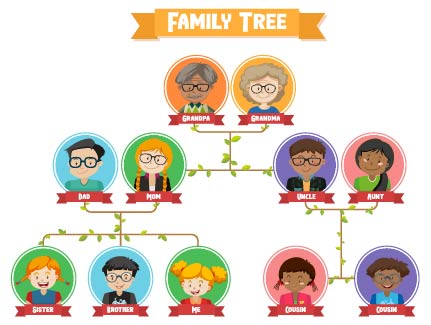
3. Nowadays, families are not as close as in the past and a lot of people have become used to this.
Why is this happening?
Do the advantages of this trend outweigh the drawbacks?
⇒ Sample Essay 3:
There has been a trend over recent decades for families to become less close than they were in the past and this situation is largely accepted in society. This essay will discuss the reasons for this and examine the benefits and drawbacks of this development.
One of the first reasons for a decline in the closeness of families is connected to the busy lifestyles that we now lead. Most people are having to work longer hours and often both parents work, so they simply do not have as much time to spend with each other as they did in the past. Another factor is the materialistic and consumer driven culture we now live in, which has led to less value being placed on family relationships. Modern technology also means that people are more interested in their online life than interacting with their family in their free time.
It could be argued that this has benefits. If people are not so close with their family, they are free to pursue their own dreams and aspirations, and to focus on improving their own lifestyle. However, I believe that there are far more negative outcomes. The most important factors leading to a fulfilled and happy life are emotional security and comfort. Without these we are in danger of feeling lost. It is a difficult world we live in and we need the support of people close to us to cope with modern life. We are seeing a rise in mental health problems in many countries and this may well be a factor in this.
To conclude, busy modern lifestyles, changing cultural values and modern technology are causing families to become less close. We should try to halt this trend as it has more negative than positive outcomes.
(294 Words)
4. Many parents encourage young people to leave home when they become older, while others think they should stay at home with the family.
Discuss both views and give your own opinion.
⇒ Sample Essay 4:
It has become increasingly prevalent for young adults to leave home before getting married. In my opinion, this is a positive trend taken as a whole because it fosters independence but it can have rare debilitating financial drawbacks.
The main drawback to moving out early is losing a parental safety net that safeguards financial stability. In large cities such as New York, real estate prices are so high that without a high-paying job you will struggle to contend with rent, food, transportation costs, and allowances for leisure activities. It is even possible that these hardships could prove overwhelming and pride may prevent you from going back to your parents. These individuals might end up taking a job with a low salary or that is not their passion.
The aforementioned drawbacks are the exceptions; the majority of people who move out are successful because they become self-reliant. A standout example of this is the typical American university student. Most students leave their parental home at 18 and never look back. These students take their first baby steps towards looking after themselves by doing their own laundry, managing their finances to an extent, and taking on campus employment. Once they graduate from university they will likely take over their entire financial outlay. This means they must find a good job and spend more responsibly. These qualities, of frugality and responsibility, will serve them well in their lives and increase their odds of future success.
In conclusion, the majority benefit from the added responsibility that leaving home brings. To encourage more people to move out parents should provide a degree of financial support when necessary but focus more so on fostering their children’s independence.
(281 words)
Nếu bạn muốn nâng cao các kỹ năng cần thiết trong bài thi IELTS nhưng chưa biết bắt đầu từ đâu, đừng quên tham khảo các khóa học tại JOLO English tại đây nhé!
--------------------------------------
Tìm hiểu thêm các khóa học tại JOLO English - Hệ thống trung tâm dạy Tiếng Anh uy tín nhất tại Hà Nội và HCM :
- Khóa học Luyện Thi IELTS tại Hà Nội và HCM
- Khóa học Tiếng Anh Giao Tiếp tại Hà Nội và HCM
- Khóa học Tiếng Anh cho trẻ em
Hệ Thống Trung Tâm Anh Ngữ JOLO:
- Hà Nội: 093 618 7791
- TP. HCM: (028) 7301 5555
- JOLO: Số 4, ngõ 54 Nguyễn Thị Định, Q. Cầu Giấy, Hà Nội
- JOLO: Số 27 Trần Đại Nghĩa, Q. Hai Bà Trưng, Hà Nội
- JOLO: Số 67 Thụy Khuê, Q. Tây Hồ, Hà Nội
- JOLO: S4.01 Vinhomes Smart City, Q. Nam Từ Liêm, Hà Nội
- JOLO: Số 7, đường số 2, Cư Xá Đô Thành, Q.3, Tp.HCM
- JOLO: Số 2, tầng 1, tòa C2, Vinhomes Central Park, Q. Bình Thạnh, TP.HCM
- JOLO: S3.020215, Vinhomes Grand Park, P. Long Thạnh Mỹ, TP. Thủ Đức, TP. HCM



